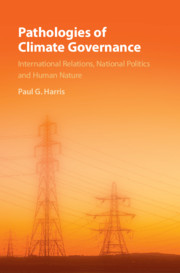Book contents
- Pathologies of Climate Governance
- Pathologies of Climate Governance
- Copyright page
- Contents
- Acknowledgements
- Figures and Tables
- Abbreviations and Acronyms
- Part I Problems
- Part II Pathologies
- 3 Pathologies of International Relations
- 4 Pathologies of National Politics in the United States and China
- 5 Pathologies of National Politics in the Global North
- 6 Pathologies of National Politics in the Global South
- 7 Pathologies of Human Nature
- Part III Prescriptions
- References
- Index
7 - Pathologies of Human Nature
from Part II - Pathologies
Published online by Cambridge University Press: 27 February 2021
- Pathologies of Climate Governance
- Pathologies of Climate Governance
- Copyright page
- Contents
- Acknowledgements
- Figures and Tables
- Abbreviations and Acronyms
- Part I Problems
- Part II Pathologies
- 3 Pathologies of International Relations
- 4 Pathologies of National Politics in the United States and China
- 5 Pathologies of National Politics in the Global North
- 6 Pathologies of National Politics in the Global South
- 7 Pathologies of Human Nature
- Part III Prescriptions
- References
- Index
Summary
This chapter explores the pathologies of human nature. It describes why human population matters for climate governance, especially insofar as it is associated with voluntary material consumption. Consumption almost invariably involves the direct or indirect use of energy, which globally still comes disproportionately from fossil fuels and thereby contributes to greenhouse gas pollution. This means that, while the size of the human population matters greatly for climate change, what matters even more is how many people are consuming more than necessary to meet their needs. This chapter also describes some of the individual, social and economic forces that stimulate people’s consumption behaviors. One of the contemporary pathologies of human nature is increasing materialism and overconsumption. Finally, the chapter highlights how the impact of human nature on climate change and its governance is being exacerbated enormously as more people around the world obtain the economic resources to consume much like people of the developed world. The globalization of consumption is a growing force that has made effective climate governance extraordinarily difficult.
Keywords
- Type
- Chapter
- Information
- Pathologies of Climate GovernanceInternational Relations, National Politics and Human Nature, pp. 130 - 158Publisher: Cambridge University PressPrint publication year: 2021



